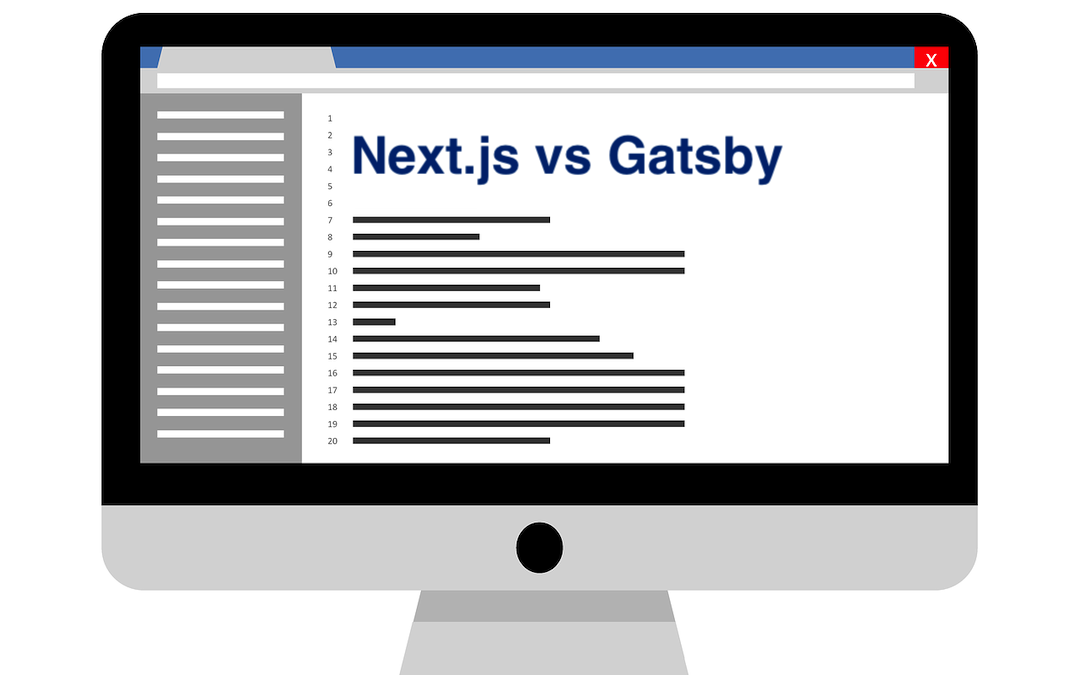
Introduction
Explore on a journey into the realm of Web Application Development with Next.js and Gatsby, two powerful tools that simplify the process of creating exceptional websites.
Next.js, akin to a set of finely tuned instruments, focuses on speed, usability, and SEO optimization. Gatsby, on the other hand, emerges for those seeking fast websites with a secure and stable foundation.
What is Next.js?
Next.js is a special tool used in making websites. It helps developers build websites that are fast and work well. Think of it like a set of tools that makes creating websites easier.
Key features
- Fast Loading: Next.js makes sure your website loads quickly, so people don't have to wait. Next.js will become the most used web framework in 2023. A recent survey says, 42.7 % of respondents use Node.js.
- Fine to use: Next.JS is easy to use for developers. Also, it promises to make the website-building process more smooth.
- Suggested for SEO: Next.js makes your website more visible to people. It helps to show up your website in the search engines.
Examples of projects suitable for Next.js
- Online Stores: Next.js is good for making fast and dynamic online stores.
- Blogs: If you want to have a blog with lots of articles, Next.js can handle it well.
- Interactive Websites: Websites where users can do things, like commenting or real-time updates, work great with Next.js.
What is Gatsby?
Gatsby is another tool for building websites. It's like a superhero for making super quick websites. Developers use Gatsby when they want websites to load fast.
Key features
- Speedy Websites: Gatsby is known for creating websites that load in a snap.
- Lots of Plugins: Developers can easily add extra features to their websites using Gatsby's plugins.
- Secure and Stable: Gatsby websites are often very secure and don't break easily.
Examples of projects suitable for Gatsby
- Blogs and Personal Websites: Gatsby is excellent for making blogs where articles load super fast.
- Portfolio Sites: If you want to showcase your work or projects, Gatsby can make it look awesome.
- Marketing Websites: When you need a website to promote something quickly, Gatsby is a great choice.
Comparative Analysis: Choosing Between Next.js and Gatsby

There are various aspects present there to find out which is best between - Next.js and Gatsby. Here is the comparison of the two giants in simple terms.
Performance Metrics
- Page loading time: No one wants to experience a long time of page loading. So the page needs to show up fast on the internet. the sole goal of both Next.js and Gatsby is to make your website load in seconds.
- SEO: Needless to say, SEO is unavoidable to make your website rank higher in search engines like Google. check thoroughly which framework helps your site be found easily.
Development Flexibility and Ease of Use
- Development Flexibility: This means how easily you can make changes or add new features to your website. Some projects need more flexibility, and we see which framework provides that.
- Ease of Use: We look at how easy it is for developers to work with these frameworks. If something is easy to use, it usually means fewer mistakes and faster development.
Ecosystem
This is like the world around these frameworks. What other tools and resources are available? A framework with a fine ecosystem will make your website more compatible.
Factors to Consider when Choosing Between Next.js and Gatsby
Project-Specific Requirements and Constraints
- Think about what your project needs. What type of content do you want? Do you want the content to be changed frequently? Or do you want your content to be more static and not to undergo more changes?
- Consider any specific features or functionalities your project requires. For example, do you need server-side rendering for better performance, or is static site generation sufficient?
- Look at the size and complexity of your project. Some projects might benefit more from one framework than another based on their unique needs.
Balancing Ease of Development with Long-Term Scalability
- Consider how easy it is to develop with each framework. Few frameworks may be beginner-friendly meanwhile other frameworks can be agile for advanced users.
- Think about the future. Will your project grow, and will the chosen framework still support it as it scales up? Consider scalability – the ability of your project to handle more users, content, or features over time.
- Find the right balance. How easy is to develop is important for getting started quickly. Also, the framework has to grow with your project needs in the long run.
Choosing Next.js
When you should go for Next.js:
Server-Side Rendering (SSR)
Next.js is a great choice if your project wants to render pages on the server side. SSR supports enhancing the ability. It also makes sure that the first page loads faster to promise a better user experience.
Dynamic Web Applications
If your web application requires frequent updates to its content and dynamic changes, Next.js can handle this efficiently. It allows for seamless updates without compromising on performance.
Choosing Gatsby
When Gatsby might be the better fit:
Content-Centric Websites and Blogs
If your web page is content-centric, then Gatsby is your go-to choice. It can easily handle large amounts of content gracefully. This provides users with a smooth and quick experience as they can easily navigate between the blogs and articles.
Fast Static Site Generation
Gatsby comes to the rescue in projects where static site generation is mandatory. Even in the build process, it pre-builds the pages.
Factors such as project-specific requirements, ease of Web App Development, and long-term scalability shape the choice between Next.js and Gatsby. Each framework finds its niche – Next.js excels in server-side rendering and dynamic applications, while Gatsby shines in content-centric projects and fast static site generation.
Conclusion
Ultimately, the decision rests on aligning the unique needs of the project with the strengths of these robust frameworks. Choose wisely, and let the journey of web development unfold seamlessly with a good Software Development Company.
Share this post
Leave a comment
All comments are moderated. Spammy and bot submitted comments are deleted. Please submit the comments that are helpful to others, and we'll approve your comments. A comment that includes outbound link will only be approved if the content is relevant to the topic, and has some value to our readers.

Comments (0)
No comment